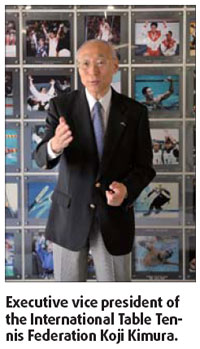Koji Kimura, 66, remembers the first Chinese phrase he learned - "chi bao le", which means "I am full". Always warmly received by his Chinese hosts, the Japanese table-tennis player had to use the phrase often during his more than 50 trips to China.
In those past five decades, Kimura witnessed the friendship between the two countries on and off the ping-pong table.
 The veteran paddler and Executive vice president of the International Table Tennis Federation and vice president of the Japan Table Tennis Association, first landed on China in 1961 to attend the 26th World Table Tennis Championships. He was 19 then.
The veteran paddler and Executive vice president of the International Table Tennis Federation and vice president of the Japan Table Tennis Association, first landed on China in 1961 to attend the 26th World Table Tennis Championships. He was 19 then.
In those days, the newly founded People's Republic of China had little experience in hosting world sporting events.
Still, a new stadium in Beijing - today's Workers Stadium - was constructed. It was filled with spectators every day. Tickets were sold out. The audience cheered for both teams.
After the event, Prime Minister Zhou Enlai invited the Japanese team to dinner. He gave a long speech before the banquet.
"China will continue to exist over a long period of history," Kimura recalls Zhou saying.
"However, there still remain in China feudalistic customs. Sports will be a great help to rid China of such feudalistic customs and ways of thinking."
Kimura was impressed by the idea of reconstructing China through sport.
Equally impressive to him was fellow paddler Kimiyo Matsuzaki, then aged 22. Matsuzaki lost her match but kept her smile the whole way, winning high praise from Zhou. During the meal, Zhou asked about Matsuzaki's family and gave her two bottles of Moutai liquor when he learned that her father worked in the alcohol industry. One of the bottles is still carefully preserved in her home.
More impressive and memorable events were to follow.
The annual table tennis match between players of the two countries started the next year, with Kimura in the first team. In the spring, the Japanese team came to China, followed by the Chinese team heading to Japan in the fall. The paddlers usually stayed in each other's country for three weeks.
Many saw the two countries that had fought an eight-year war earnestly trying to build ties by playing together.